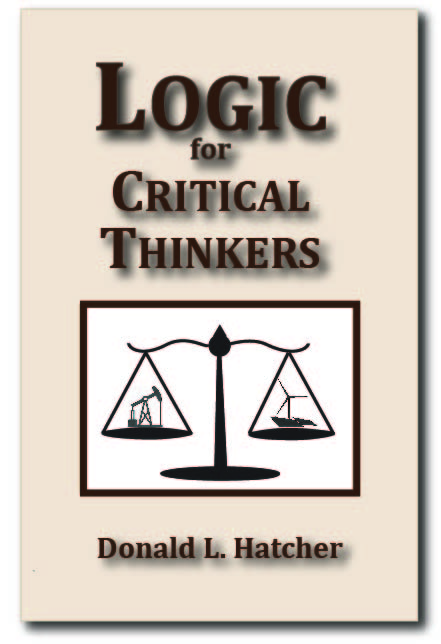Academic, Professional, Technical, Trade, Research Books & Journals
americanpress@flash.net • 617-247-0022 • 75 State Street #100 • Boston, MA 02109
Logic for Critical Thinkers
by DONALD L. HATCHER
1st edition 2021, 100 pages
ISBN 978-0-89641-605-5
$16.95 (includes shipping)

Donald Hatcher has been teaching college-level philosophy for over 40 years. As anyone who has tried to teach philosophy knows, a lot of what they do involves understanding, analyzing, and evaluating arguments. Early in his career Dr. Hatcher realized that asking students to do these things was pretty hopeless unless they knew something about logic. Without that knowledge what he tended to get were lots of student opinions based primarily on their feelings and culturally-biased intuitions. Students in a class would often disagree. But, without any knowledge of how to make and evaluate arguments, there was no way to determine which position made more sense. He thought that a basic knowledge of logic might really help.
Of course, in a typical fifteen-week semester, there was no way to require students to read “a real logic or critical thinking text.” That would take far too much time. So, in the middle 80s, Dr. Hatcher wrote a version of this short text on logic and critical thinking and have since used it in many of his classes. It has made a significant difference in the quality of class discussion, as well as students’ papers. Student knowledge of logic also allowed him to be more technical in some of his lectures. This was especially true in Philosophy of Science classes.
Because of its relative simplicity, the approach he chose is “Deductive Reconstruction.” For those trained in formal logic, it has a certain intuitive appeal. The approach was used in Gerald Nosich’s early text, Reasons and Arguments (1982) and in Cederblom and Paulsen’s text Critical Reasoning (1982). Very simply, students are asked to construct valid deductive arguments for or against a position and then evaluate the reasonableness of the premises. This approach also seemed like it might be a useful tool for writing critical papers—an assignment common in many classes (Hatcher & Spencer).
Philosophy is not the only discipline that focuses on the evaluation of arguments. So, the scope of this text’s usefulness is broad.
CONTENTS
Chapter 1:
AN OVERVIEW OF CRITICAL THINKING
1.1 Introduction
1.2 An Overview of Two Kinds of Arguments
1.3 The Rational Person
1.4 Summary of the Strategy
Exercise 1.1: Discussion Questions
Exercise 1.2: Identifing Arguments
Exercise 1.3: Responding to DisagreementsChapter 2:
UNDERSTANDING: THE FIRST STEP IN EVALUATING ARGUMENTS
Exercise 2.1: Summarizing ArgumentsChapter 3:
EVALUATING ARGUMENTS; DEDUCTIVE VALIDITY
3.1 Deductive Validity
The Modus Ponens Argument Form
3.2 Some Invalid Argument Forms
The Modus Tollens Argument Form
The Disjunctive Syllogism Argument Form
Exercise 3.1: Identifying Premises and Conclusions
Exercise 3.2: Symbolizing Arguments
Exercise 3.3: Supplying Missing Premises
Exercise 3.4: Constructing Arguments
Exercise 3.5 Summary ExercisesChapter 4:
INDUCTIVE LOGIC AND PREMISE ACCEPTABILITY
4.1 Deduction and Induction
4.2 The Nature of Inductive Reasoning
4.3 Conclusion
Exercise 4.1: Distinguisining Deductive and Inductive Arguments
Exercise 4.2: Discussion Questions
Exercise 4.3: Necessary and Sufficient Condition ExercisesChapter 5:
EMPLOYING LOGICAL SKILLS
5.1 Ealuating Arguments
5.2 Constructing Arguments for Papers
5.3 Conclusion
Exercise 5.1: Constructing Arguments for PapersAppendix A:
MORE HINTS ON WRITING A CRITICAL PAPERAppendix B:
INFORMAL FALLACIES
Genetic Fallacy
Appeal to False Authority
Arguments from Ignorance
Appeal to Numbers
Equivocation
False Cause
False Dilemma
Exercise B1: Identify the Informal FallaciesWORKS CITED
INDEX
ABOUT THE AUTHORS
Donald L. Hatcher is the Walter Bailey Chair of Humanities and Professor of Philosophy at Baker University in Baldwin City, KS. Besides numerous scholarly papers on critical thinking theory, pedagogy, and assessment, he is the author of Understanding the “Second Sex" (1985), Reasoning and Writing: From Critical Thinking to Composition (with Anne Spencer, 2006) and Logic for Critical Thinkers (2021).